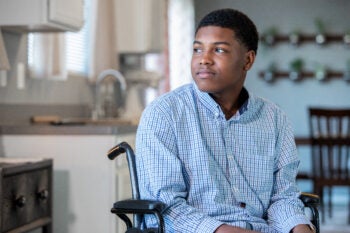Home /
How to Help Your Child Process Grief

Navigating grief can be intense for anyone, however when children are involved, this process becomes even more delicate. Processing grief with a child requires compassion and an insightful approach, as death and loss can be much harder for them to conceptualize.
How do I explain death and loss to a child?
Much of how death is explained will vary based on the age of the child. For younger kids ages zero to 10, using simple and concise language will be most effective in explaining death to them. “While it may feel uncomfortable to say, use words like ‘death’ and ‘die’ rather than ‘lost’, ‘passed’, or ‘gone’” says Karen Hassselman, School-Based Counseling Team Lead at Centerstone. “Younger kids may understand these terms to mean something else, such as having lost a toy, so it’s important to use more direct language that is easier for them to understand.” Being as straightforward as ‘your grandma died in the hospital today and she is not coming back, but she loved you very much’ may be a tough message to deliver, but can make processing the loss much easier on a young child. Kids ages 11 to 18 have a better understanding of what death is and what it means which may make conversations surrounding death a little different.
What is the best way to help a child understand the feelings of grief they’re experiencing?
How grief is processed and understood will also depend on the age of the child. See different examples below:
- For ages zero to three, they will have no concept of loss but if they are old enough to ask questions, answer them honestly and in simple terms.
- For ages four to 10, encourage them to use a creative outlet in processing their feelings. “Have them draw a picture of the person who died or of things that remind them of that person,” adds Hasselman, “In doing this, ask them how it makes them feel.” It is also incredibly important to remember to be patient with them, as they may not fully understand the scope of what is happening.
- For ages 11 and up encourage them to continue engaging in their hobbies and stay active. Remind them that even though they’re grieving, they’re still allowed to feel joy. Kids in this age range will also need a different type of a support than a younger child. Support groups for kids their age who have also experienced a significant loss can be helpful to allow them to understand that they aren’t the first or only person to feel this way.
For kids of any age, it can be helpful to allow them to hold on to items that remind them of the deceased. Whether they want to place picture of them in their room, or sleep with an old blanket of theirs, having these items can help them still feel close to that person.
It may also be helpful to know that, as a result of processing grief, some kids may start to act out. They may become angry or particularly upset at the point in their day where the deceased was typically part of their routine. For example, if they lost the parent who always used to read to them before bed, they may become angry or unsettled around bedtime. “It can be hard for kids of any age to adjust to a disruption in routine,” adds Hasselman, “it is beneficial for those around them to try to honor the routine they had with that person and adjust it to work for them.”
How can I help my child process their grief?
Since adults have a much different understanding of grief, it is important to model appropriate grieving behaviors for kids. It is counterintuitive to tell your child that they should go to a support group to process their grief when you aren’t doing the same for yourself. “Be willing to be vulnerable and open up to accept the help you’re willing to give your child,” Hasselman adds.
As your child is processing grief, it is important to be patient with them as this may be a new emotion they’ve never experienced before. If you are looking for extra support in your healing, Centerstone can help. Visit our counseling services page or call 877-HOPE123 (1-877-467-3123) to get started.


